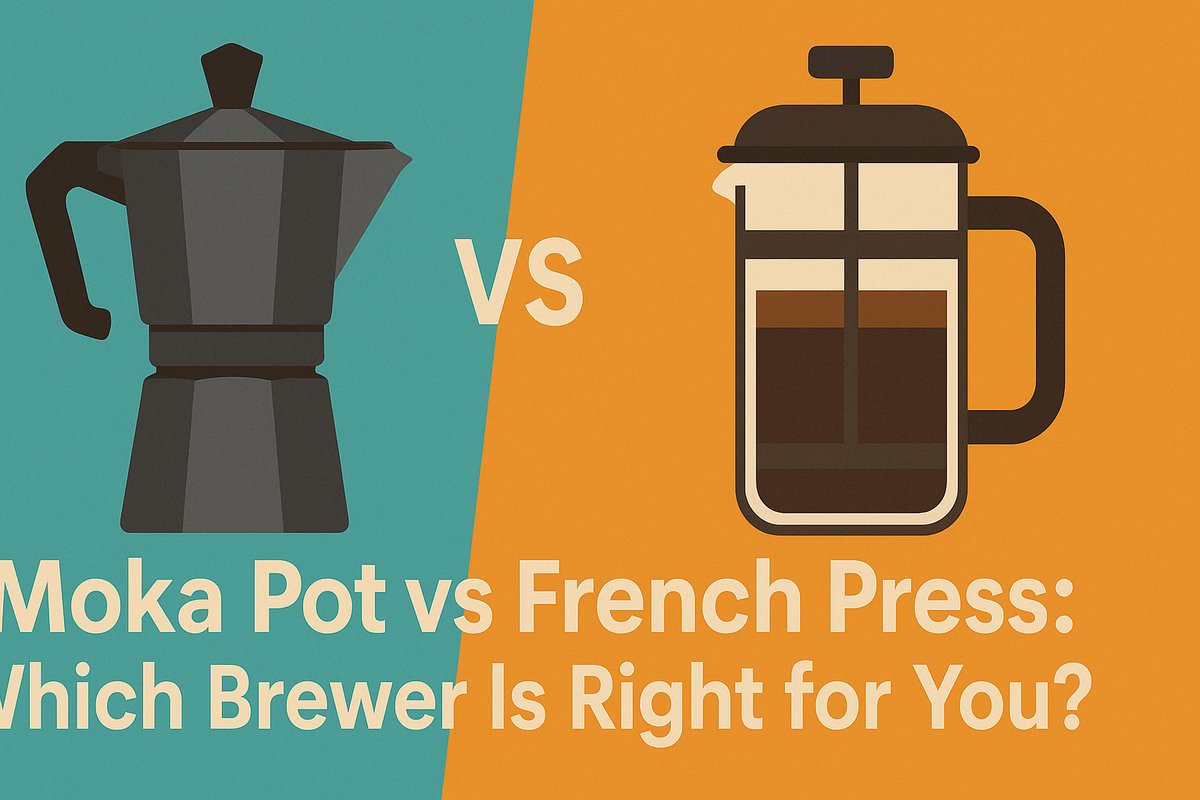Moka Pot vs French Press: Which Brewer Is Right for You?
Two titans of home brewing go head-to-head. Discover the key differences between moka pot and French press brewing to find your perfect match.
Sarah Johnson
Senior Coffee Reviewer & Brewing Specialist

When it comes to brewing coffee at home, few debates are as passionate as moka pot versus French press. Both methods have devoted followers who swear by their chosen brewing technique, and for good reason—each produces a distinctly different cup of coffee that appeals to different tastes and lifestyles.
Whether you're a coffee newcomer trying to choose your first brewing method or a seasoned enthusiast looking to expand your arsenal, this comprehensive comparison will help you understand the strengths and weaknesses of each approach.
At a Glance Comparison
| Feature | Moka Pot | French Press |
|---|---|---|
| Brew Time | 4-5 minutes | 4-6 minutes |
| Coffee Strength | Strong, concentrated | Full-bodied, rich |
| Difficulty Level | Moderate | Easy |
| Price Range | $15-80 | $20-60 |
| Maintenance | Medium | Low |
The Moka Pot: Italian Tradition
The moka pot, invented by Alfonso Bialetti in 1933, uses steam pressure to force water through coffee grounds, creating a strong, espresso-like beverage. This iconic octagonal brewer has become synonymous with Italian coffee culture and can be found in kitchens worldwide.
Moka Pot Advantages
-
Concentrated Flavor: Produces strong, intense coffee similar to espresso, perfect for milk-based drinks.
-
Compact Size: Takes up minimal counter space and is perfect for travel.
-
Durable Construction: Quality aluminum or steel models can last decades with proper care.
-
No Filters Needed: Built-in metal filter means no ongoing costs for paper filters.
-
Authentic Experience: Offers a traditional Italian brewing ritual with satisfying results.
Moka Pot Disadvantages
-
Learning Curve: Requires practice to master timing and heat control for optimal results.
-
Heat Source Required: Needs a stovetop, limiting portability compared to immersion methods.
-
Potential for Bitterness: Easy to over-extract if heat is too high or timing is off.
-
Fixed Serving Size: Each pot size makes a specific amount—no flexibility for different quantities.
The French Press: Simple Elegance
The French press, also known as a press pot or cafetière, uses immersion brewing to create full-bodied coffee. Coffee grounds steep in hot water for several minutes before being separated by a metal mesh plunger. This method, dating back to the 1920s, emphasizes simplicity and control.
French Press Advantages
-
Easy to Use: Simple process that's nearly impossible to mess up—perfect for beginners.
-
Full Control: Complete control over water temperature, brewing time, and coffee-to-water ratio.
-
Rich Flavor Profile: Metal mesh allows oils and fine particles through, creating fuller body.
-
Flexible Serving Size: Can easily adjust coffee amount for different quantities.
-
No Heat Source Needed: Only requires hot water, making it perfect for camping or office use.
French Press Disadvantages
-
Sediment in Cup: Metal mesh allows fine particles through, creating gritty texture some dislike.
-
Heat Loss: Coffee cools quickly in glass vessel, requiring immediate consumption.
-
Fragile Construction: Glass versions are prone to breaking if dropped or heated unevenly.
-
Over-extraction Risk: Coffee continues extracting after plunging if left in contact with grounds.
Taste Profile Comparison
Moka Pot Coffee
- Intensity: High, concentrated
- Body: Medium to full
- Acidity: Low to medium
- Flavor Notes: Bold, sometimes slightly bitter
- Mouthfeel: Clean, minimal sediment
- Best For: Espresso-style drinks, milk beverages
French Press Coffee
- Intensity: Medium to high
- Body: Full, rich
- Acidity: Well-balanced
- Flavor Notes: Complex, well-rounded
- Mouthfeel: Heavy, with some sediment
- Best For: Black coffee, showcasing bean characteristics
Which Should You Choose?
Choose Moka Pot If You:
- Love strong, concentrated coffee
- Enjoy milk-based drinks like cappuccinos
- Appreciate traditional brewing rituals
- Have limited counter space
- Don't mind a learning curve
Choose French Press If You:
- Want simple, foolproof brewing
- Prefer full-bodied, complex flavors
- Need brewing flexibility for different quantities
- Often brew coffee away from the kitchen
- Value complete control over variables
Cost Analysis
Moka Pot Costs
- Initial Investment: $15-80
- Replacement Parts: $5-15 (gaskets, filters)
- Maintenance: Low to moderate
- Ongoing Costs: Minimal
French Press Costs
- Initial Investment: $20-60
- Replacement Parts: $10-25 (new carafes)
- Maintenance: Very low
- Ongoing Costs: None
The Verdict
Both the moka pot and French press are excellent brewing methods that serve different preferences and lifestyles. The moka pot excels at producing strong, concentrated coffee with an authentic Italian experience, while the French press offers simplicity and full control over the brewing process.
Your choice ultimately comes down to personal preference: Do you want the ritual and intensity of moka pot brewing, or the simplicity and flexibility of French press? There's no wrong answer—both methods can produce exceptional coffee when executed properly.
Pro Tip
Why not try both? Many coffee enthusiasts own multiple brewing methods to match their mood and occasion. A moka pot for morning intensity and a French press for leisurely weekend brewing can give you the best of both worlds.